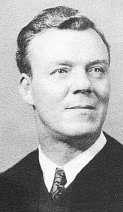A Quote by David Hume
Enthusiasm, being the infirmity of bold and ambitious tempers, is naturally accompanied with a spirit of liberty; as superstition,on the contrary, renders men tame and abject, and fits them for slavery.
Related Quotes
Liberty lies in the hearts of men and women; when it dies there, no constitution, no law, no court can save it ... The spirit of liberty is the spirit which is not too sure that it is right; the spirit of liberty is the spirit which seeks to understand the minds of other men and women; the spirit of liberty is the spirit which weighs their interests alongside its own without bias.
Experience should teach us to be most on our guard to protect liberty when the Government's purposes are beneficent. Men born to freedom are naturally alert to repel invasion of their liberty by evil-minded rulers. The greatest dangers to liberty lurk in the insidious encroachment by men of zeal, well meaning but without understanding.
It has been said that "to enthuse" means "to fill with spirit," and that spirit of enthusiasm is awaiting release or manifestation. Enthusiasm can be harnessed and activated. It can be transferred from one person to another. The energy of enthusiasm is similar to a radio signal that carries around the world. It can be transmitted and received; and when enthusiasm is shared by a group of people, it can be potentiated to a higher degree of power.
For, contrary to the common opinion, it is the wealthy who are greedy of wealth; while the populace are to be gained by talking to them about liberty, their unknown god. And so much are they enchanted by the words liberty, freedom, and such like, that the wise can go to the poor, rob them of what little they have, dismiss them with a hearty kick, and win their hearts and their votes for ever, if only they will assure them that the treatment which they have received is called liberty.
I look upon enthusiasm, in all other points but that of religion, to be a very necessary turn of mind; as indeed it is a vein which nature seems to have marked with more or less strength, in the tempers of most men. No matter what the object is, whether business, pleasures or the fine arts: whoever pursues them to any purpose must do so con amore.
Of course, there are dangers in religious freedom and freedom of opinion. But to deny these rights is worse than dangerous, it is absolutely fatal to liberty. The external threat to liberty should not drive us into suppressing liberty at home. Those who want the government to regulate matters of the mind and spirit are like men who are so afraid of being murdered that they commit suicide to avoid assassination.
For stories teach us, that liberty sought out of season, in a corrupt and degenerate age, brought Rome itself to a farther slavery: for liberty hath a sharp and double edge, fit only to be handled by just and virtuous men; to bad and dissolute, it becomes a mischief unwieldy in their own hands: neither is it completely given, but by them who have the happy skill to know what is grievance and unjust to a people, and how to remove it wisely; what good laws are wanting, and how to frame them substantially, that good men may enjoy the freedom which they merit, and the bad the curb which they need.
The Constitutional framers were peace men; but they preferred revolution to peaceful submission to bondage. They were quiet men; but they did not shrink from agitating against oppression. They showed forbearance; but that they knew its limits. They believed in order; but not in the order of tyranny. With them, nothing was "settled" that was not right. With them, justice, liberty and humanity were "final;" not slavery and oppression.
In most ages many countries have had part of their inhabitants in a state of slavery; yet it may be doubted whether slavery can ever be supposed the natural condition of man. It is impossible not to conceive that men in their original state were equal; and very difficult to imagine how one would be subjected to another but by violent compulsion. An individual may, indeed, forfeit his liberty by a crime; but he cannot by that crime forfeit the liberty of his children.







































